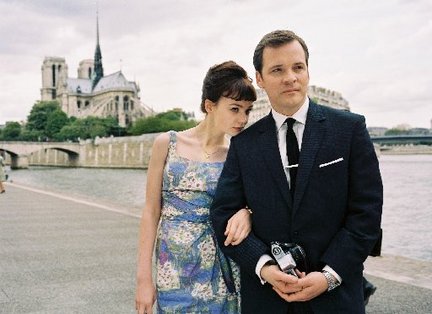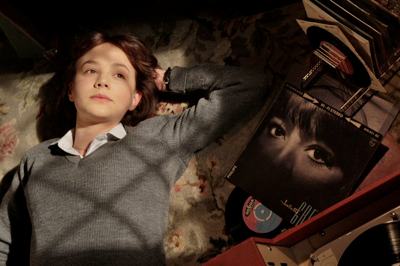 FILM
FILM « In Which Heaven Forbid We Should End The Evening Reflecting On Our Own Mortality »
 Tuesday, February 23, 2010 at 12:49PM
Tuesday, February 23, 2010 at 12:49PM 
As You Can See, I Just Love Things
by ELEANOR MORROW
dir. Lone Schorfig
95 minutes
Nick Hornby has spent his years listening to the Beta Band and haunting us all with his elegiac tales of how white people also have feelings. Then he wrote How to Be Good, one of the worst books of the twentieth century. After that he just hung out a lot and read Sasha Frere-Jones and thought about how much he sucked as a music writer in comparison and how he wished he was Hugh Grant or even, sometimes, Colin Firth. Then he adapted Lynn Barber's Granta article about getting boned by Peter Sarsgaard into a movie. Luckily, Peter Sarsgaard was available for this important role because Jeff Bridges was doing his wife.

At first, An Education is about Jenny (Carey Mulligan), a silly young girl who gets A+ marks on her papers but really at her heart just wants a bun in the oven. (When the bun is not available, she wisely opts for a latke.) Of course this is how Nick Hornby believes all young girls think, and when David Goldman (Peter Sarsgaard) pulls up in his sharp automobile and reveals to everyone's surprise than he is both smarter and better-looking than her domineering dad, Jenny's pleased as punch.

The difference in age is glossed over rather quickly, but unlike a similar relationship that Roman Polanski had some time ago, here a banana was only used for the breaking of the hymen. It's totally cool with Jenny's parents that David gives her lavish gifts, and makes up an elaborate story about knowing C.S. Lewis. After all, before 1961, no one in the world was creepy.

The movie then does a 40 minute stretch where Jenny becomes more aware of David's general tendency towards inaccuracies and lies. He also coincidentally reveals that he is a Jew; well, he actually does this within minutes of meeting her. It is truly a wonder that they didn't consider forcing the character to wear a yellow star, but I guess the time frame didn't really allow for that.
 I didn't have a major, but my thesis was on Latin American economic policy.Jenny's dowdy teacher is played by Rushmore's Olivia Williams. This is good for a laugh, but ultimately it's a bit disturbing that Olivia once played the hot teacher and now she's playing the one unfamiliar with mascara. Soon enough Jenny is off on trips to Paris and Oxford, which are places a million miles away from where she was before, even though every part of England looks the same except when James Herriot is involved.
I didn't have a major, but my thesis was on Latin American economic policy.Jenny's dowdy teacher is played by Rushmore's Olivia Williams. This is good for a laugh, but ultimately it's a bit disturbing that Olivia once played the hot teacher and now she's playing the one unfamiliar with mascara. Soon enough Jenny is off on trips to Paris and Oxford, which are places a million miles away from where she was before, even though every part of England looks the same except when James Herriot is involved.

David's business partner is Danny (The History Boys' Dominic Cooper, replacing Orlando Bloom). The two steal paintings and money and work for Peter Rachman, the famous Notting Hill slumlord. David is slightly more at ease with this lifestyle than Danny. The filmmakers cast the most gentile partner-in-crime they could think of, and then made him the ethical conscience of this whole storyline.

Danny is in fact the most morally upright thief in history, and he tells David that he doesn't want to see Jenny hurt, and he tells Jenny that she has a future that doesn't include David. It's almost like David's ability to manipulate and distort situations rubbed off on this poor, gentile criminal.

The last movie that so lavishly perpetrated invidious anti-Semitic stereotypes besides the Harry Potter movies was Schindler's List. (The Pianist wasn't so great either.) Avatar was also borderline anti-Semitic, given that the qualified member of the anthropological team was Jewish and he never got to put his blue thing into her blue thing because Sam Worthington was in the way. Also, why were there no chosen people in The Matrix? Think about that.

Of course, the only exciting thing about An Education is the Jewish man. He takes everyone to the nicest places, the finest bars and restaurants. And no one asks any questions about this, until they do, and then they're super-disappointed. If this isn't the most alarmingly anti-Jewish metaphor for the Third Reich I've ever heard, it's up there.

The English turn the Jew into the other because they're too afraid of anything really different, so they prefer the slightly less boring version of their own lives. In Hornby's imagination, the ideas that provincial people have about non-provincial people are generally provincial. In this case, they're bigoted, too - as Jenny's father, Alfred Molina dislikes all the Jews he knows, but he professes that "he's not really like that."

Uh-huh. And the goblins that haunt Gringotts are just for funsies, and the Brothers Grimm had lots of Jewish friends.
 I know you're mad now, but can I get your word that this won't become a movie?The most pernicious of the literary Jew haters was maybe Roald Dahl. Matilda is one of the most bracingly anti-Semitic stories of its time, including a mustachioed car salesman who cons his customers by rolling back their odometers and pores over the Torah during evenings. Don't get me started on Charlie on the Chocolate Factory. I really don't know what the English fascination with the Jews is, all I do know is that Peter Sarsgaard is about the most Gentile actor I can think of, I mean he was an altar boy for christ's sake. He's from southern Illinois; the only Jews there are in Obama's field organization.
I know you're mad now, but can I get your word that this won't become a movie?The most pernicious of the literary Jew haters was maybe Roald Dahl. Matilda is one of the most bracingly anti-Semitic stories of its time, including a mustachioed car salesman who cons his customers by rolling back their odometers and pores over the Torah during evenings. Don't get me started on Charlie on the Chocolate Factory. I really don't know what the English fascination with the Jews is, all I do know is that Peter Sarsgaard is about the most Gentile actor I can think of, I mean he was an altar boy for christ's sake. He's from southern Illinois; the only Jews there are in Obama's field organization.

An Education falls in the end rather flat, but mainly because this is a story that has been told so many times we can barely suffer through it once more. What surrounds that tale is easier to recommend. The visuals and performances are diverting, and the direction is capable, a microcosm of the story itself, where mere excitement isn't enough to carry meaning forward any. As in About a Boy and High Fidelity, An Education dismisses a way of life as inadequate without finding anything worthwhile to replace it. An Education is the perfect Hornby project, because as John Cusack openly wonders at the end of High Fidelity, isn't attraction just liking the same things?

Near the end of the film, after David asks her to marry him, Jenny finds papers in his glove compartment that he left there for her so that he doesn't have to go through with the marriage. They inform her that he is a married person. Instead of thanking him for his openness, she calls him and his friends liars. She instructs him to tell her parents that the whole thing was all his mistake, as if she had nothing to do with it. After getting kicked out of school, she still gets to Oxford, and true to her real-life counterpart, she spends the next seven years working for Penthouse.
Eleanor Morrow is the senior contributor to This Recording. She is a writer living in New York. She last wrote in these pages about Crazy Heart.

"Easy Chairs" - Suckers (mp3)
"It Gets Your Body Movin'"- Suckers (mp3)
"Afterthoughts & TV" - Suckers (mp3)































Reader Comments (6)
You twenty-something blogger/critics are entertaining but I wish you would dig in sometimes and try harder to write something with a bit more bottom, rather than the sort of tossed-off, smug, dismissive tone that so many of these pieces, especially this one, have.
If you like John Cusack, make sure to check out the 2012 facebook page :) http://bit.ly/kBzNs
Eleanor, have there been any recent films that you actually liked?
I completely agree with the first commenter, DB. Except that I don't even really find this article entertaining. Also, is it really that hard to look at films through a historical lens? Especially the comparisons to Roman Polanski. 1961 England is much much different than 1977 America, among other things. But there's enough pop culture references and dismissive cynical comments to entertain the masses, so I guess keep up the good work. But this 21-year-old isn't biting.
imagine if that D.B. stood for David Bordwell... probably not though.